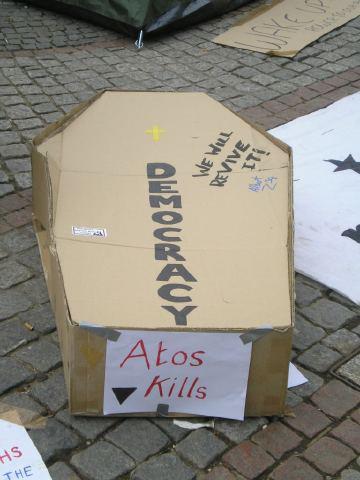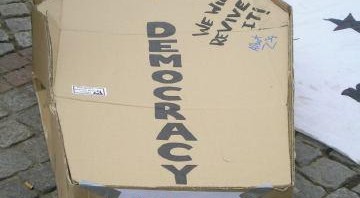 (Black Triangle’s) John McArdle, of the newly formed Scottish Anti-Cuts Coalition, points out that for his party one of the problems is that Edinburgh City Council has banned all candidates from putting up posters. “There are 22,000 electors out there in my Leith Walk ward and its an utter impossibility to even let those people know that we exist. That’s blatantly unfair to people like ourselves.”
(Black Triangle’s) John McArdle, of the newly formed Scottish Anti-Cuts Coalition, points out that for his party one of the problems is that Edinburgh City Council has banned all candidates from putting up posters. “There are 22,000 electors out there in my Leith Walk ward and its an utter impossibility to even let those people know that we exist. That’s blatantly unfair to people like ourselves.”
McArdle believes it is lack of publicity that hobbles most new parties and independents. “People don’t take them seriously because they don’t get enough exposure.”

Published on 29 April 2012
Vicky Allan
Scotland is the least democratic nation in the developed world when it comes to local elections, claims a report published today by Scotland’s left-wing think-tank, the Jimmy Reid Foundation.
By comparison with other countries, Scotland has a lower voter turnout for council elections, fewer people putting themselves forward as candidates and fewer elected officials, The Silent Crisis report says.
A league of voter turnout shows Austria at the top with 73% and Scotland with 54%. This year, because the local elections are not being teamed with a national poll, the turnout is expected to be even lower. Some predictions suggest it will be as low as 30%.
Scotland also has much bigger local councils than many other countries, with local government representing many more people and vastly more land area than in other countries. This leads to a situation where councils are, the report says, “in no really meaningful sense ‘local’, certainly not at community level”.
Dr Eberhard Bort, one of the report’s authors, is a German living in Scotland and says he has long been “puzzled by the situation.” He notes that often politicians will talk about Scotland being “over-governed” as if we have too many elected officials working for us. In fact, across Scotland there are 1271 elected councillors. His home region in Germany, with a population twice the size of Scotland’s, has 20,000. There is also more interest in local democracy in other countries. In Scotland, 2947 candidates were fielded in the last poll; in Baden-Wurttemberg 60,000 candidates stood in the last local election.
The figures in the report are stark: “In France one in 125 people is an elected community politician. In Austria, one in 200. In Germany one in 400. In Finland one in 500. In Scotland it is one in 4270 (even England manages one in 2860).”
This lack of local democracy is of particular interest to the current crop of independent or small party candidates. Many of them have come to politics through community campaigns and are cynical about the current system.
Gordon Murdie is a quantity surveyor, who was prompted to stand as an independent candidate in Edinburgh’s Southside/Newington ward by his experiences helping the victims of Edinburgh Council’s statutory repairs scandal, which is alleged to have revealed corruption in the property conservation division. His provocative election leaflet states: “Your money is being haemorrhaged by institutional ineptitude and petty party politics”.
Eberhard Bort notes that in Germany there is a movement called the “free voters”. “The town hall should be free of party politics”, is their slogan. This view is echoed by many Scottish independents.
Several new parties are fielding candidates in this election for the first time. The Scottish Anti-Cuts Coalition has candidates in areas of both Edinburgh and Glasgow, and the Pirate Party – which surprised with its recent success by drawing 8.5% votes in the German elections – is standing two candidates in Glasgow and one in Edinburgh.
The Pirates stand on a ticket of reforming copyright laws, supporting privacy, reducing surveillance and freedom of speech. Rob Harris, a 24-year-old physics student standing in Anderston/City in Glasgow and campaigning for democratic transparency as well as digital rights, expresses the alienation often felt: “If you look at the turn-out, it’s clear there’s something wrong. Politicians don’t seem to be engaging with the majority of the population – young people under 30 like me.”
John McArdle, of the newly formed Scottish Anti-Cuts Coalition, points out that for his party one of the problems is that Edinburgh City Council has banned all candidates from putting up posters. “There are 22,000 electors out there in my Leith Walk ward and its an utter impossibility to even let those people know that we exist. That’s blatantly unfair to people like ourselves.”
McArdle believes it is lack of publicity that hobbles most new parties and independents. “People don’t take them seriously because they don’t get enough exposure.” As a result many independents and small parties resort to stunts to amuse and get attention. In the Pentlands area of Edinburgh, for instance, Mike Ferrigan, an environmental activist, is dressing up as a penguin to win over voters. He has even vowed to wear the costume in council meetings. The purpose of this? “To bring some lightness and humour to the affair,” he said. ”This may help to bring about a more consensual approach to politics within the chamber.”
Scottish Liberal Democrats and Scottish Labour put the blame for the problem identified in the Reid Foundation report on the “deeply centralising agenda of the SNP”.
Willie Rennie, Scottish Liberal Democrat leader, said: “It is important that all political representatives recognise that voter apathy can be linked to an agenda for centralisation. The Silent Crisis raises a number of questions about the kind of democracy we want in Scotland.”
The Scottish Conservative local government spokeswoman, Margaret Mitchell, said: “The way to improve local democracy is to make local people feel as if they have a say. As it stands, people across Scotland are watching the SNP overturn planning applications on phone masts and wind farms – applications these people and their councils have fought against for a variety of reasons.”
The report does not suggest wholesale reorganisation of our current system. But, rather, it proposes a layer of democracy below local authority level.
The Scottish Green Party has greeted the report warmly. Chas Booth, currently standing for the party in Leith in Edinburgh, argues: “Greens have got lots of ideas about how we can reinvigorate local democracy and try to reconnect people with Scottish democracy.
“A lot of our candidates come from a community activist background. More than half of Green candidates have some involvement with their local community council or similar organisation.”
The SNP’s local government minister, Derek Mackay, said: “Community councils can play an important role as the voice for their community and as a focus for local energies. We recognise the role the community council can play and remain committed to supporting them.”
He added that the proposed Community Empowerment and Renewal Bill is meant to “support communities to achieve their goals and aspirations through taking independent action … this could be about taking ownership of land or buildings, tackling derelict property or strengthening the voice of communities in shaping public services.”
THE SMALLER PARTIES by VICKY ALLAN


No responses yet